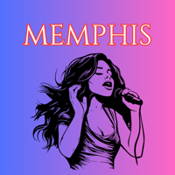
Overview
Synopsis
Hockadoo! Memphis is the story of Huey Calhoun (loosely based on real-life 1950s disc jockey Dewey Phillips) and his mission to bring blues and soul music to a white southern audience. In a time of segregation, Huey optimistically believes that music can transcend race, and with him on his journey is aspiring singer Felicia Farrell. The two fall in love, but must contend with social barriers, a prejudiced mother, and an overprotective brother. With a soulful score and vibrant dance numbers, Memphis is a crowd-pleasing adventure of music and love in the 1950s South.
Show Information
Context
Memphis the Musical is a high-energy Broadway production with music by David Bryan and book/lyrics by Joe DiPietro. Loosely inspired by the life of DJ Dewey Phillips, one of the first white radio personalities to broadcast Black music in the 1950s, the show explores the cultural upheaval sparked by the collision of segregated communities and the birth of rock ‘n’ roll. It premiered on Broadway in 2009 and went on to win the Tony Award for Best Musical in 2010, praised for its electrifying
to read the context for Memphis and to unlock other amazing theatre resources!Plot
Act One
A white disc jockey welcomes his listeners to the number-one radio station, in the center of the dial, before being interrupted by a black disc jockey calling out from the top of the dial to his listeners spread only a mile away. The scene shifts to Delray Farrell’s underground club on Beale Street (“Underground”). The clubgoers dance as Delray’s sister Felicia takes to the microphone, chiding her overprotective brother and revealing her desire to be more than a club singer. At
to read the plot for Memphis and to unlock other amazing theatre resources!Characters
| Name | Part Size | Gender | Vocal Part |
|---|---|---|---|
|
Lead |
Male |
Tenor |
|
|
Lead |
Male |
Baritone |
|
|
Lead |
Female |
Mezzo-Soprano |
|
|
Supporting |
Female |
Mezzo-Soprano |
|
|
Supporting |
Male |
Baritone |
|
|
Supporting |
Male |
Tenor |
|
|
Supporting |
Male |
Baritone |
|
|
Featured |
Male |
Spoken |
|
|
Featured |
Male |
|
|
|
Featured |
Male |
|
|
|
Featured |
Male |
Spoken |
|
|
Featured |
Male |
|
|
|
Featured |
Female |
Spoken |
|
|
Featured |
Male |
Spoken |
|
|
Featured |
Female |
|
|
|
Ensemble |
Either Gender |
|
Songs
Act I
Act II
A song with an asterisk (*) before the title indicates a dance number.
Monologues
Scenes
Key Terms
Motown refers to a style of popular music that emerged in Detroit in the 1960s, blending elements of soul, rhythm and blues, and pop. Known for its polished sound and infectious rhythms, Motown launched the careers of legendary artists such as Diana Ross, Stevie Wonder, and Marvin Gaye. In theatre and film, Motown often symbolizes cultural pride, crossover success, and the power of Black artistry.
A period piece is a theatrical work set in a specific historical era, recreating its fashions, manners, and cultural atmosphere. Costumes, sets, and dialogue are often designed to reflect the chosen time period as accurately as possible. Period pieces allow audiences to step into another age and experience its unique style and traditions.
Rock and roll is a musical genre that originated in the United States in the 1950s, combining rhythm and blues with country and gospel influences. Characterized by strong beats, electric guitars, and youthful energy, it quickly became a symbol of rebellion and change. In theatre, rock and roll often represents social upheaval, generational conflict, and the rise of new cultural voices.
Segregation refers to the enforced separation of people in daily life, often based on race, class, or ethnicity. In the United States, racial segregation was a defining feature of society in the early to mid-20th century, affecting schools, businesses, entertainment venues, and public spaces. On stage, segregation serves as a backdrop for stories of injustice, resilience, and the struggle for equality.
Videos
Quizzes
Themes, Symbols & Motifs
Themes
The Power of Music to Bridge Divides
to read about the themes, symbols and motifs from Memphis and to unlock other amazing theatre resources!Quote Analysis
Sorry! We do not currently have learning modules for this guide.
